Description
Blue Headed Pionus formerly sale
Blue headed pionus for sale, one of the most well known and popular of the Pionus parrots, the Blue-headed Pionus are active, intelligent and inquisitive. Though they are not known to be the best talkers, they make up for this with their friendly disposition and fun antics. The Blue-headed Pionus is known for its gentle demeanor and may become a highly devoted companion, connecting passionately to their owner at times.They are regarded a wonderful birds for a first-time parrot owner, and because they are normally calm and quiet, they are also an excellent pet for people who live in apartments or close to neighbors where noise might be a concern.
They have an uniform green plumage with a brilliant blue head, black feathers over the ears, and pink throat feathers. The Blue headed Pionus, like many Pionus, does not reach full coloration until it is adult, but when it does, its gorgeous feathers have an almost iridescent quality.
The colour of the birds varies greatly, with some having a stronger shade of blue on the head and more or less of the pinkish coloring on the throat. They have the bright red undertail feathers distinguishable to all the pionus. The beak is a dark grey color getting red close to the head, the eye is dark brown with a light grey eye ring, and they have pale greenish-grey legs.
Care and feeding Blue Headed Pionus for sale
A Pionus diet consisting of a good parrot mix which includes formulated foods, a variety of seeds, and dried fruits is generally regarded as a suitable base to provide nutrition and variety. Along with this, provide a daily supplement of fresh fruits and vegetables.
They are active by nature and can become overweight if confined. Like the Amazon parrots they require a low fat diet. Good Pionus bird care starts with providing a good diet.
Bird Food:
Foods available for Pionus parrots include formulated diets, either pelleted or extruded, seed only diets, and parrot mixes which offer a mixture of both. There are pros and cons to feeding only a formulated diet as well as feeding only a seed diet.
Formulated Diet
A formulated diet provides a good nutritional base so does not require the addition of vitamins, however it does not contain the phytonutrients (antioxidant pigments) that are found in vegetables, fruits, grains, and seeds. Phytonutrients are believed to boost the immune system, help a body to heal itself, and to prevent some diseases. Also parrots can become bored with a formulated diet due to the lack of variety.
Seed Diet
A seed only diet offers much more variety but requires additional vitamin and calcium supplements. Variety is important in the diet for psychological enrichment.
Supplements
Fruits Supplements such as apples, pears, plums, cherries, grapes, oranges, bananas, mangos, papayas, and berries such as strawberries and blueberries. Vegetables are also good supplements such as carrots, cucumbers, zucchini, many garden vegetables, and even dandelions and chickweed. Do not feed avocado as it may be toxic to birds!
Water:
Give your Pionus fresh drinking water every day.
Bird Baths:
The personal hygiene of your Pionus parrot includes a regular shower for good plumage and skin condition.
Handling/Training
A hand raised Pionus parrot makes a delightful pet, but like all parrots it needs a bit of time to become accustom to its new environment.
Taming Basics:
Though a Pionus parrot is quick to adapt to its new home, you should give a new arrival a few days to get use to you, your voice and its cage before trying to handle it. A hand fed baby will not need much taming and can often be handled right away, as it is use to human attention.
To be able to handle and train your parrot depends first on trust, so go slowly and be consistent. Remember that bird taming and bird training takes patience, never ‘punish’ you parrot! This only serves to destroy the trust you’ve spent so much time building.
Initial Training
Your first goal is to get the parrot to accept a treat from you, which will lead to it allowing you to gently scratch its head. Then you can begin to work on getting your parrot to step up on your hand. Depending on the tameness of the bird, these two steps can be instantaneous as in a hand fed baby or take several weeks or longer for an untamed bird.
Pionus are not extremely cuddly birds but they do love having their head, ears, and neck scratched.
Advanced Training
Repetition and frequency are the keys here to get your Pionus parrot talking. Almost every parrot can learn at least a few words, although unlike the African grey, their mimicry sounds rather ‘parrot-like’.
Blue Headed Pionus Colors
The Blue Headed Pionus’s stunning plumage is responsible for the bird’s name as well as its enormous popularity among pet owners. These birds have a bright green body with bronze overtones on the upper regions of their wings. The head has a beautiful blue color that extends to the middle of the bird’s breast. As with all Pionus parrots, they have deeper, dusty colored circles on each cheek and red feathers on the undersides of their tails. Another distinguishing feature of these birds is a red patch on the top mandible of the beak.
Personality
Blue-headed Pionus Parrots are increasingly popular as pets. They are very affectionate and although they are not birds that particularly enjoy being cuddled, they do love a head scratch.
They are quite independent birds, they are happy to amuse themselves with toys and food without constant attention from the owner. Well-socialized pionus parrots really enjoy interacting with people.
They can be noisy with light, high-pitched squeaking calls. However, compared to other parrot species (conures or amazons), they are relatively quiet. They talking ability is generally considered “poor” – although some say they are the best talkers in the Pionus family.
Social Behaviors:
In the wild they are generally seen as just a few birds up to small flocks of about 15 birds. They are seen singularly or in pairs during breeding season. These birds tame very easily and are very sociable. They are not loud like many conures and amazons.
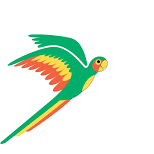
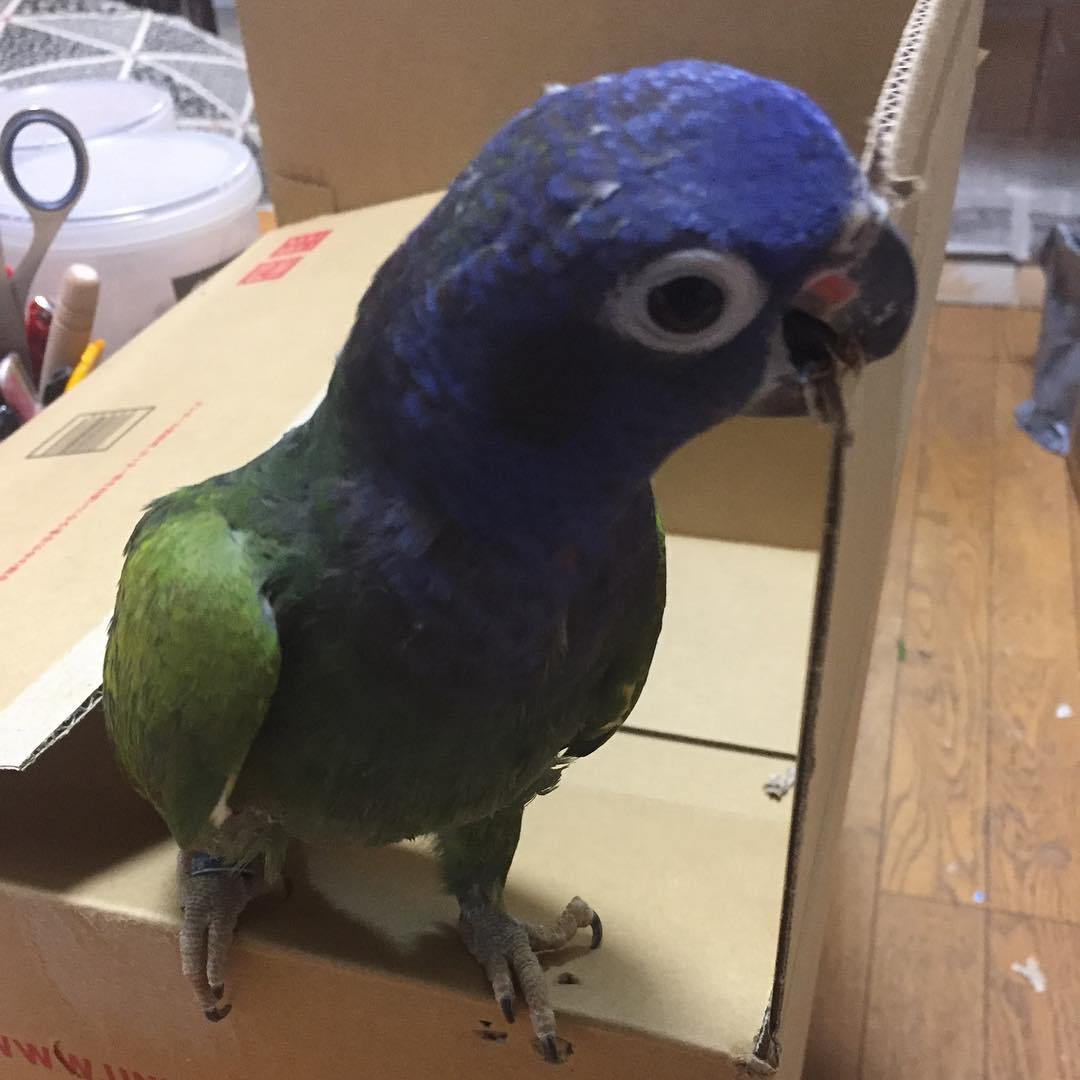

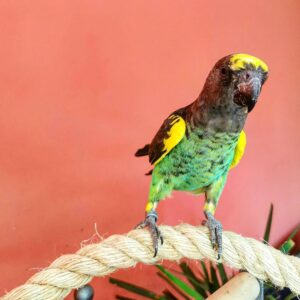
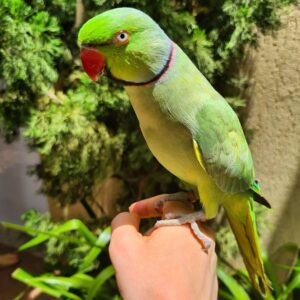
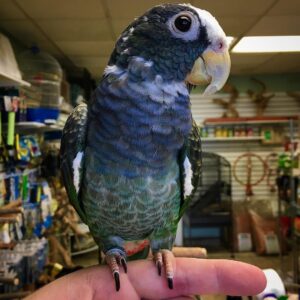
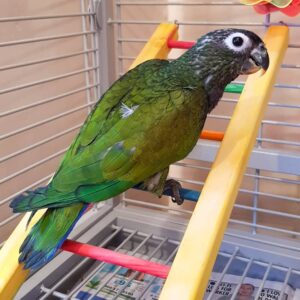
Reviews
There are no reviews yet.